David Suzuki's Blog, page 47
December 12, 2015
B.C. must do mining better
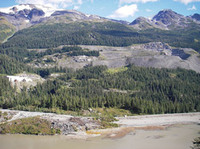
Please tell decision-makers you want real solutions to prevent another Mount Polley disaster, not short-term measures that threaten more environmental damage.
Hey! Want more DSF? Join David Suzuki on Facebook

David Suzuki Foundation is hopeful that the landmark Paris Agreement will translate into global climate action
It required extending the United Nations conference on climate change by an additional day, but the global community has produced what is expected to become a global agreement to guide action on climate change beyond the year 2020.
"This agreement marks a pivotal moment in history," said the David Suzuki Foundation's director of science and policy, Ian Bruce. "While it may not be perfect, this text presents the first ever global agreement to eliminate fossil fuels and transition to 100 per cent renewable energy. It is ambitious and addresses many of the previously existing gaps in global climate action."
Highlights of the final agreement include:
Recognition for the goal of limiting average global temperature rise to 1.5°C (with the 2°C level serving as an absolute ceiling).
A five-year review cycle (beginning in 2018) to evaluate and strengthen national action plans to reach the goal of zero emissions.
Financing to help the most vulnerable and least developed nations cope with the impacts of climate change while cutting their own carbon emissions.
Linking climate adaptation goals to mitigation (cutting carbon emissions) while recognizing current science, traditional knowledge of indigenous people and local knowledge systems.
The recognition of human rights and indigenous rights.
The agreement falls short on a number of topics including dependable loss and damage payments to nations that are already feeling the impacts of climate change as well as liability for past emissions. These and other limitations will require future work to strengthen.
"The thing to recognize is that this agreement is the result of an enormous effort on the part of scientists, activists, politicians and ordinary citizens who have been engaged on the issue of climate change," said Bruce. "We will need to continue to push Canada, along with its international partners, to cooperate and act on the framework the agreement lays out and to ratchet up their ambition; but we should also recognize that this is a major achievement."
Canada played a pivotal facilitator role in drafting the agreement. Canadian negotiators were also advocates for human and indigenous rights.
"Canadians wanted leadership, and they got it," said Bruce. "The next step will be for Canada to make good on its promise of new ambitious targets and a complete climate action plan. What Canada does matters."
The government of Canada has pledged to provide new, more ambitious national targets within 90 days of the Paris Agreement. That clock begins now and ends March 11, 2016.
30
For more information or commentary contact:
In Paris:
Steve Kux
David Suzuki Foundation
00-1-604-374-5095
skux@davidsuzuki.org
In Vancouver:
Theresa Beer
David Suzuki Foundation
778-874-3396
tbeer@davidsuzuki.org
In Montreal:
Manon Dubois
David Suzuki Foundation
514-679-0821
mdubois@davidsuzuki.org
Hey! Want more DSF? Join David Suzuki on Facebook

December 11, 2015
I remember Doug Tompkins
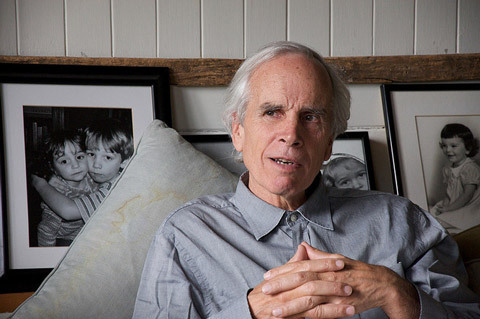
(Credit: Sam Beebe via flickr)
Doug Tompkins recognized that genuine sustainability requires protection of large tracts of land, not small reserves that allow people to press in on wildlife. He has left a lasting legacy in the land he bought and dedicated to remain forever wild.
But I remember Tompkins for what was to him, a small act that had huge repercussions in my family. In 1991, when the David Suzuki Foundation (DSF) was a brand new entity, Doug flew his own plane accompanied by Bill Devell, a deep ecologist, to visit our family on Quadra island. DSF was still too new to have a clear direction (Tompkins did support our work years later) but he happened to chat with Severn, our eleven year old daughter.
She had stayed in an Amazonian Kaiapo village in 1989 where she was horrified to witness forest destruction, so she formed ECO (Environmental Children's Organization) to visit schools and talk about the importance of forests. She learned about a conference to be held in Rio in 1992 and decided to take her club "to remind grownups that their decisions affected children". Tara and I were not planning to attend, but Severn told Tompkins about her plan. "That's a good idea", he said, "write to me". All this I learned later when she came in brandishing a cheque for $1000 from Tompkins!
That's when Tara and I decided her idea had merit so we told her we would support her by matching every dollar she raised. I never imagined that would come to $14,000! She took five children and three adults (including me and Tara) to the Earth Summit at Rio where the late Canadian Maurice Strong heard of Severn's message and put her on the program to speak to delegates. Her speech was a powerful plea for action that has now been viewed by millions on YouTube. She has gone on to become an activist and Doug Tompkins had a huge impact on her life with his generous gesture.
Hey! Want more DSF? Join David Suzuki on Facebook

December 10, 2015
Healing humanity's grief in the face of climate change

(Credit: USFWS Mountain-Prairie via Flickr)
The tragedy we're witnessing in so many places around the world is heartbreaking. Responses on the ground and in the media to events in Paris, Beirut, Syria and elsewhere have ranged from inspiring to chilling. Too often, people express fear and distress as anger, suspicion and scapegoating.
For many reasons and in many ways, people and nature are in distress. Quaker activist and author Parker Palmer implores us to ask, "What shall we do with our suffering?" The way we deal with our pain has critical implications. Whether we project it outward as war or murder or absorb it as despair and self-destruction, "Violence is what we get when we do not know what else to do with our suffering."
The interplay of environmental degradation and geopolitics has had alarming repercussions. Over the past decade alone, millions of people have been displaced by war, famine and drought. The world is shifting rapidly as a result of climate change and there's little doubt we'll see increasing humanitarian crises. We must face this new reality as a global community.
Climate change is one of the most destabilizing forces in human history. We must deal with carbon emissions but we must also deal with human suffering. In Canada, Inuit are feeling the impacts disproportionately. Ice appears much later in the season and melts earlier. Changing wildlife migration patterns disrupt community livelihoods, land-based activities and cultural practices.
Cape Breton University Canada research chair Ashlee Cunsolo Willox is working with Inuit to understand their communities' climate-related mental and emotional health impacts, documenting anxiety, despair, hopelessness and depression, increased family stress, drug and alcohol use and suicide attempts. People are grieving for a way of life that is changing with the landscape.
Together with the Nunatsiavut communities of Labrador, Cunsolo Willox produced a documentary film, Attutauniujuk Nunami/Lament for the Land. Residents describe how ice, when it forms, is often not thick enough to hunt, gather wood or travel by snowmobile.
The land is part of who they are, a source of solace, peace, identity, and well-being. Hunting and fishing and spending time on the land help Inuit feel grounded and happy. When residents can't get out of town, they feel "stuck", "lost" and "less like people".
Although global warming discourse typically ignores our intense feelings and grief in the face of environmental change, Cunsolo Willox argues it can expand our capacity to act. "Re-casting climate change as the work of mourning means that we can share our losses, and encounter them as opportunities for productive and important work," she says. "It also provides the opportunity to stand up and publicly object to injustice." Shared experiences of grief can build solidarity, support healing and inspire collective action.
With the Paris UN climate talks underway, we have an opportunity to expand the conversation to include environmental grief and loss. Today's social and environmental leaders need to understand the psychological implications of a world in distress. Geographer and research scientist Susanne Moser predicts future leaders will need more than professional expertise and political savvy. They must be "steward, shepherd, arbiter, crisis manager, grief counselor, future builder."
Instead of knee-jerk reactions that so often accompany fear and emotional pain, what if we summoned the courage to experience our sadness, disorientation and grief in all its fullness? More importantly, what if we did this together? The feelings surrounding change and loss highlight our shared vulnerability and expose our connections to one another. We can consciously foster a heightened sense of human and ecological fellowship.
The late environmental scientist Donella Meadows believed the process of experiencing feelings is far from trivial. "Feelings, like knowledge, don't directly change anything. But if we don't rush past the feelings or stuff them down, if we take time to admit even the most uncomfortable ones, to accept them, share them, and couple them with knowledge of what is wrong and how it might be fixed, then feelings and knowledge together are motors for change."
The suffering we're witnessing because of loss of land, culture, ways of life and identity may portend what is to come for all of us. Now is the time to come together and decide how we will respond. Let's make sure it's the best humanity has to offer.
Speak up -- tell Canada's leaders to take climate action!
Hey! Want more DSF? Join David Suzuki on Facebook

December 9, 2015
Send holiday e-cards to show your love!

In Canada, 'tis the season of shorter days and long, dark nights -- time for celebrations of light of all kinds! This year, send season's greetings and show your planet-sized affection for the people you care about with holiday e-cards that use no paper, postage or transportation while powering programs to protect the people and places you love.
Hey! Want more DSF? Join David Suzuki on Facebook

Your questions about the UN climate conference answered
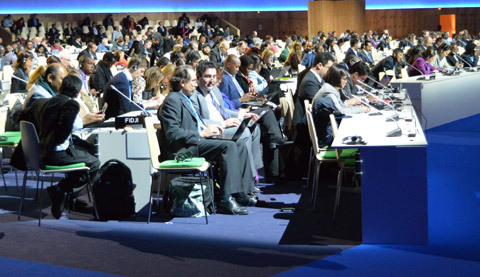
(Credit: Steve Kux)
The goal of the UN negotiations in Paris is to agree on ways countries can co-operate to fight climate change. Some of the major issues being discussed are human rights, the role of indigenous knowledge in evaluating affects, how rich countries can assist poorer countries, accelerating clean energy and what threshold should be considered the limit of allowable temperature rise (1.5 C or 2 C) to keep communities safe.
Here are answers to some the questions you asked:
1. How will emissions from agriculture and animal farming factor into the negotiations?
While emissions from raising animals for food is clearly an important part of the problem, global negotiations focus on general issues and leave details up to specific countries.
In Canada, livestock farming is responsible for between 10 and 19 per cent of our total emissions and Canadians on average eat twice as much meat as the rest of the world. By enjoying meatless meals a few times a week and advocating for policies that measure livestock emissions in climate change regulations, we can begin to address this problem at home.
Yes -- I want bold action from Canada at the climate talks!
2. Carbon emissions are bad for the environment and human health. When will governments stop providing subsidies to the most polluting industries?
Ending fossil-fuel subsidies would go a long way to helping the world transition to renewable energy, eliminate wasteful energy consumption -- even restore a country's finances.
Past and present Canadian governments have committed to eliminate these subsidies, but action has been slow. Our federal government promised new emissions reduction targets within 90 days following the Paris Agreement. The David Suzuki Foundation will work hard to push for ambitious goals that include ending fossil-fuel subsidies, but the more support we have from people like you, the louder our voice will be.
3. Are leaders considering public education programs to curb energy waste and over-consumption?
Public education is critical to addressing climate change, especially teaching people how to reduce energy use. Governments also need to pass laws requiring buildings, vehicles and consumer products to use less energy.
Making better use of the energy we already produce, along with cutting emissions overall will be an important part of the climate action strategies developed by many countries after the conference negotiations end. And financial commitments from developed countries like Canada will help developing countries use energy as efficiently as possible.
4. How much influence do big, carbon-polluting corporations have on the UN climate negotiations?
It's impossible to say what forces influence the priorities of different nations, but business interests are present at the climate conference and considering their perspective is important. Major corporations can have a positive impact on climate action.
During the first week of the conference, some the world's wealthiest people -- including Bill Gates, Mark Zuckerberg and Richard Branson -- came together to form the Breakthrough Energy Coalition to invest in renewable energy, energy storage and agricultural technologies to cut carbon emissions. And several major energy companies have called for an ambitious international agreement that will allow them to reduce their own emissions while remaining competitive globally.
But we still need to push when entrenched interests get in the way of action.
5. How can 196 countries with different interests reach a common agreement? What's the process?
As tempting as it is to think of 196 prime ministers and presidents locked in a room together, the process is slightly different.
Each country is represented at the climate negotiations by ministers (like Canada's minister of environment and climate change) and several professional negotiators working in favour of their nation's interests. They spend long hours together working on the text, debating the wording of each sentence over and over again until an agreement is reached and the document shrinks from nearly 100 pages to something more manageable.
Groups like the David Suzuki Foundation meet with representatives from the various countries and make recommendations about what text should remain in the agreement and what can be removed.
The last conference days are crunch time and we hope an agreement will be reached soon. We've made a lot of progress so far and, although the Paris summit is important, it's just the beginning. The real work starts when officials get back to Canada.
It's great to see so many people interested in the process. Thanks for your questions!
Hey! Want more DSF? Join David Suzuki on Facebook

Reflections and wishes as I approach my 80th birthday
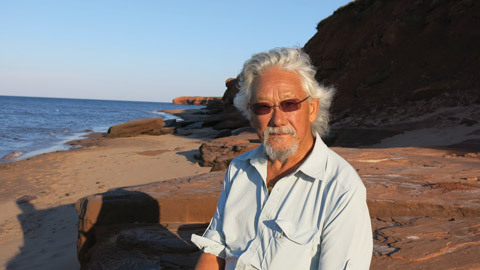
(Credit: Nadege Vince)
For more than 25 years, I've studied and communicated about the seriousness of the climate crisis. It was the main reason my wife, Tara, and I joined other thinkers to start an environmental organization, which we named the David Suzuki Foundation (a name I initially rejected) -- now celebrating its 25th year!
I can't help thinking how much better off we'd all be had the politicians and public heeded the warnings from climate scientists and experts so many years ago. Had we taken incremental steps, we could have shifted much further from dangerous fossil fuels to energy conservation and clean energy with only minor disruptions. Now, as the consequences of global warming hit home and become increasingly severe, we have to resort to more drastic and possibly disruptive solutions.
Still, we have time. A growing body of research shows addressing climate change and other environmental challenges will not only benefit human health and well-being, but will also provide economic boosts. And not doing anything about it could be disastrous for the economies of Canada and the world.
During the federal election campaign,
we heard a lot of promises about tackling climate change. Let's hope our new government keeps its promises and works with other parties to do even more. That means making constructive contributions to next month's UN climate summit in Paris.
As my 80th birthday approaches, I look back at the good work people at the Foundation have done, to bring about fishing industry reforms, protect species at risk and their habitat, promote restrictions on pesticides that harm our children's health, find solutions to our climate and energy challenges, and so much more. None of it would have been possible without the support of hundreds of volunteers and tens of thousands of donors. Now municipalities representing more than seven million Canadians have signed declarations for the right to a healthy environment, and the Manitoba government has committed to doing so as well, using the Foundation's Blue Dot campaign to create a powerful and ever- growing movement from coast to coast to coast.
But there's still work ahead. I won't be around forever, but I care about my children and grandchildren and all the world's people, and about the planet and natural systems that allow us to thrive and survive. And so I have some birthday wishes. At the top is for world leaders to finally come up with a fair and binding agreement in Paris to reduce greenhouse gas emissions. I also wish for your continued support. Together, we've made great gains, but we have much left to do. Thanks.
Hey! Want more DSF? Join David Suzuki on Facebook

Energy East pipeline is bad for Quebec and Canada
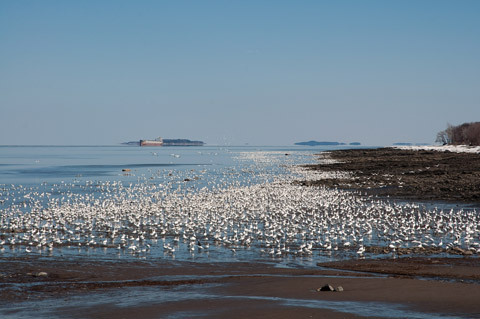
The Energy East pipeline will threaten the St. Lawrence River with no real benefits for Quebec. (Credit: Jérome Spaggiari)
While the eyes of the world turn to Paris for the upcoming 21st Conference of the Parties to establish a new international climate agreement, oil transportation projects continue to increase in Quebec and Canada. TransCanada's Energy East project is one of the largest ever proposed in North America. With a planned transport capacity of 1.1 million barrels per day, this project could have significant environmental and social impacts, including on watercourses and climate.
Because the pipeline will go through the Montreal Metropolitan Community, the David Suzuki Foundation's Quebec office submitted a brief to the MMC highlighting the environmental risks and 6 impacts and offering recommendations. The Foundation said the project puts the region's rivers at risk, including the St. Lawrence -- drinking water source for much of the region's population -- and offers few or no economic benefits for the region or Quebec. The project would also be associated with 32 million tonnes of new greenhouse gas emissions in the oil sands, equivalent to twice the emissions reductions Quebec will have achieved from 1990 to 2020.
We argued that the project is not only incompatible with Quebec's goal to reduce its emissions, but also that the environmental risks for the Montreal region are higher than the potential benefits for the MMC's 82 municipalities.
Hey! Want more DSF? Join David Suzuki on Facebook

Homegrown rain gardens win award

A rain garden is designed to naturally absorb and filter stormwater, preventing flooding.
Do you have problems with a wet basement or flooding in your yard? Ranger Marc Yamaguchi has an idea for you.
As part of the David Suzuki Foundation's Homegrown National Park Project, Marc launched the Rain Gardens of East Danforth Village project this summer. The project grew from his desire to convert his front yard into a rain garden, designed to absorb and store rainwater, keeping it away from his basement.
Marc learned that easy-to-maintain rain gardens attract bees, birds and butterflies, and are able to weather severe storms and extreme heat. He reached out to his neighbours with the idea of creating a rain garden network.
As part of 100-in-1-day on June 6, 2015, Homegrown National Park Project volunteers and local residents helped Marc dig out his yard and create the first rain garden. Then the project won the Toronto Foundation's 2015 Vital Innovation Award, including $10,000 to expand the project to 10 more yards.
In August, the Homegrown National Park Project team began digging and planting. The rain gardens all feature locally adapted wildflowers, shrubs and trees that will need little to no watering once established. A landscaped, shallow depression in each yard will naturally absorb and filter stormwater, preventing flooding.
The project will be used to encourage other homeowners to create rain gardens across the city. For information, check out www.davidsuzuki.org/raingardens.
Hey! Want more DSF? Join David Suzuki on Facebook

How to leave the leaves
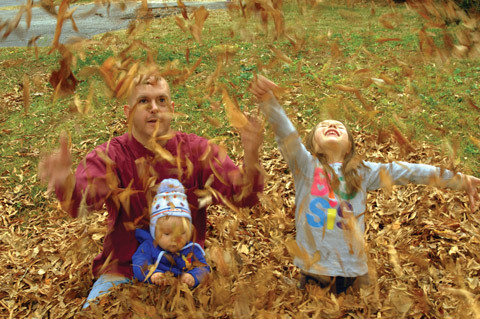
Why not leave the leaves? They’re good for butterflies and other critters.
If I know you, you can't stop helping pollinators -- planting a butterfly garden, getting your yard off grass, signing the Monarch Manifesto and more. I realize you might have snow on the ground by now, but don't feel bad if you didn't get to rake the leaves. And next fall, allow your rake to collect only dust!
Why? Because butterflies begin in leaves, as larvae. Keep leaves where gravity left them. Those brown, dead leaves are the planet's butterfly nursery and home to microbes and worms. Leaf litter is where many species of butterflies and moths overwinter as pupae. Animals like toads, shrews and salamanders benefit from leaf litter to hide and hunt, too.
If you can't leave all of your leaves where they fall, here are a few other ideas:
Mulch leaves in your planter beds.
Does your homeowners' association have something against leaves? Rake leaves off the lawn and into your planter beds.
Mulch leaves on your lawn. Use your mower to mulch leaves on the lawn and improve your lawn health by suppressing weeds and fertilizing the soil.
Collect browns to compost.
Composting 101 tells us to balance "greens" with "browns." Store leaves in a bin and add them to your backyard composter throughout the winter months.
Craft with leaves.
Have children collect their favourite leaves in your yard and throughout the neighbourhood. Then search online for nature weaving ideas or how make "craftiments".
Note: Please do rake leaves out of sewers and drainage pathways.
Hey! Want more DSF? Join David Suzuki on Facebook

David Suzuki's Blog
- David Suzuki's profile
- 247 followers



